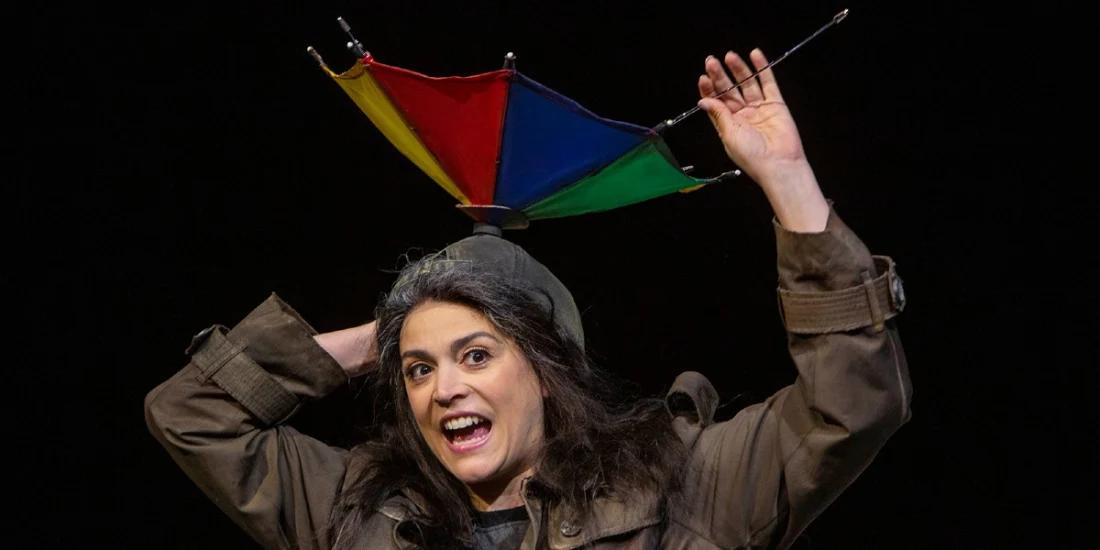'The Search for Signs of Intelligent Life in the Universe' review — Cecily Strong delivers an out-of-this-world performance
If alien life-forms ever come to Earth and require a human representative, take them immediately to Cecily Strong.
She's already had the practice, after all, playing Trudy, who is explaining Earth to aliens in Jane Wagner's The Search for Signs of Intelligent Life in the Universe at The Shed. I'd just as soon nominate Wagner (whose cosmic insights, about life's great importance being found in the small moments, are still captivating 30 years after the play premiered) or Tomlin (who made the play famous on stage and screen after Wagner wrote it for her), but I've only seen Strong perform. So I can only vouch that the seasoned SNL comedienne deftly accomplishes the most basic, yet hardest, job of all: getting us on board with the idea that she really is in tune with something beyond our earthly realm.
But the idea is not as hard to get on board with as you'd expect. Aliens, as it turns out, are just like us: Wagner's dialogue characterizes them by an interest in human behavior and a repeated tendency to run late. And they use their mysterious electric force to take Trudy not on an intergalactic adventure, but on a "channel surfing" spree through the lives of various contemporary humans, all played by Strong. Among them are the aptly named Agnus Angst, a troubled, misunderstood teenager whose tantrums you almost feel bad for laughing at; the storytelling prostitutes Brandy and Tina; the jaded, privileged Kate; and Lyn, Edie, and Marge, activists from the early days of the women's movement.
The trio's section makes the second half drag a bit, but pay attention nonetheless — blink-and-you'll-miss-them references to the other characters pop up in each person's dialogue. They're perfectly mundane: One character fired another, one is the sperm donor for another couple of characters, one found a note another dropped on the ground. Whether or not you believe that Trudy is really inhabiting all these different people or showing them to aliens, Wagner's (and by extension, Trudy's) thesis, that human lives are all connected in various unknowable ways, is made perfectly satisfying in these moments.
Trudy herself acknowledges how "crazy" she sounds when she talks about the aliens and these adventures, but counters, "Goin' crazy was the best thing ever happened to me. ... What is reality anyway? Nothing but a collective hunch. In my view, it's absurdity dressed up in a three-piece business suit," eliciting one of many hearty laughs. Trudy's embrace of "madness" is instantly endearing, due in large part to Strong's effervescence and commitment. But I couldn't help but think: The pandemic turned all we knew about "reality" — what's "normal" and and "acceptable" about day-to-day life — on its head. Maybe I, for one, have already become inclined to embrace a little crazy. Maybe I'm inclined to believe nothing truly is "crazy," and Wagner's play couldn't have come at a better time to support that.
Not to mention, The Search for Signs is a love letter to live theatre, too, that couldn't have come at a better time. When else would we believe that an umbrella hat-wearing, homeless, "crazy" woman is a time-traveling mouthpiece for the human condition? When we hear that woman talk about how the aliens behaved when she took them to the theatre. "They said it wasn't the play that gave them goosebumps, it was the audience," she says. "To see a group of strangers sitting in the dark, laughing and crying about the same thing, just knocked them out." Suddenly, nothing about the play, about aliens, about human connection seems crazy at all. The inimitable power of theatre to reinforce our shared life is something that, by simply sitting in a theatre to watch The Search for Signs, we discover to be true.
Photo credit: Cecily Strong in The Search for Signs of Intelligent Life in the Universe. (Photo by Kate Glicksberg, courtesy of The Shed)
Originally published on
